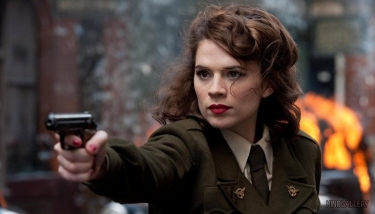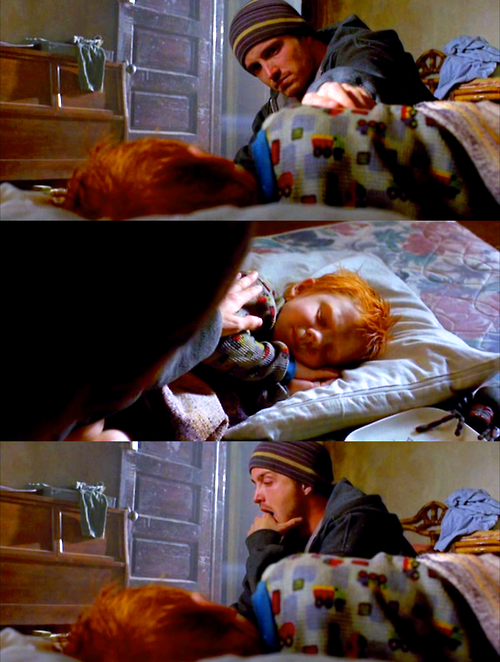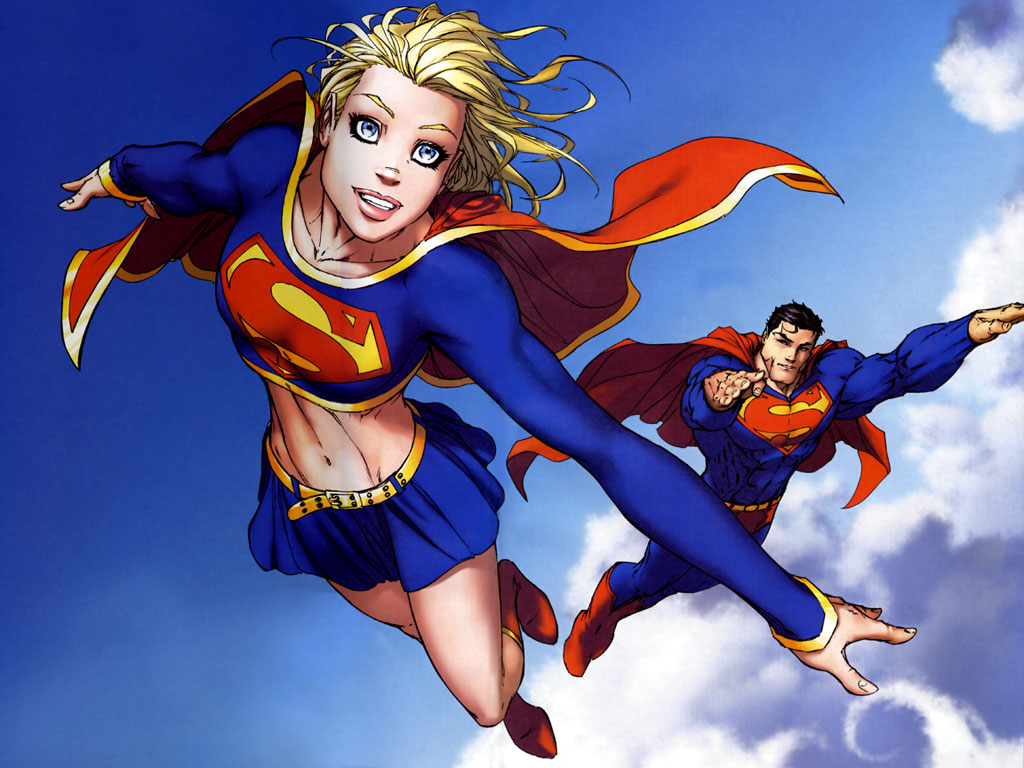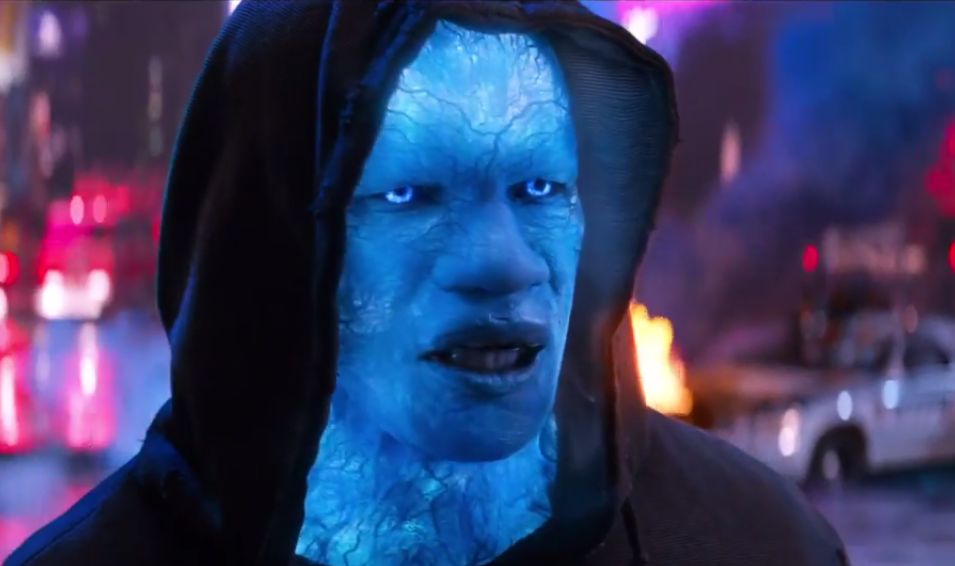 Captain America: The First Avenger
Captain America: The First Avenger
Written by Christopher Markus and Stephen McFeely
Directed by Joe Johnston
USA, 2011
With the first true Summer of Superheroes finally winding down, most discerning viewers will approach Joe Johnston’s entry into the new Marvel Studios mega-canon, Captain America, with suspicion. After all, it’s a revisionist period piece with a conceptually silly hero, coming from a director whose last movie (The Wolfman) was an unquestionable turd. Thanks in part to its charismatic lead and a sly metafictional approach, though, Johnston’s piece of the epic Marvel Studios quilt is more entertaining and less distracting in its ludicrousness than its peers.
After a brief present-day prologue informs us of our titular hero’s ultimate fate, the film rewinds to 1943 New York, where Steve Rogers (Chris Evans, aided by some  truly incredible effects work), a would-be war hero in a diminutive, sickly frame, has just been denied entry into the US Army for the fifth time. As he watches best friend and wingman Bucky (Sebastian Stan) ship off, he catches the eye of Dr. Erskine (Stanley Tucci), a German ex-pat and super-scientist, who deduces that the brave young man is the most appropriate subject for an experimental program that would transform ordinary soldiers into one-man war machines. Under the supervision of the gruff Col. Phillips (Tommy Lee Jones, looking mostly bored) and the buxom-but-tough special agent Peggy Carter (Hayley Atwell), Rogers is transformed into a physical brute easily twice his original size, but still blessed with the perspective of an eager weakling, and quickly becomes an American icon thanks to a daring Nazi-pursuit foot chase through Brooklyn.
truly incredible effects work), a would-be war hero in a diminutive, sickly frame, has just been denied entry into the US Army for the fifth time. As he watches best friend and wingman Bucky (Sebastian Stan) ship off, he catches the eye of Dr. Erskine (Stanley Tucci), a German ex-pat and super-scientist, who deduces that the brave young man is the most appropriate subject for an experimental program that would transform ordinary soldiers into one-man war machines. Under the supervision of the gruff Col. Phillips (Tommy Lee Jones, looking mostly bored) and the buxom-but-tough special agent Peggy Carter (Hayley Atwell), Rogers is transformed into a physical brute easily twice his original size, but still blessed with the perspective of an eager weakling, and quickly becomes an American icon thanks to a daring Nazi-pursuit foot chase through Brooklyn.
 What follows his transformation is easily the most interesting segent of any superhero film in years, and there isn’t an iota of action involved: after being informed that he’ll be confined to a lab rather than go to the front lines as he dreamed, Rogers opts instead to tour the country, helping to sell war bonds. In the process, he’s actually branded as Captain America, an alter ego he is trained to sell the persona and the war not only onstage, but in a series of films adapted from…a popular line of comic books. This process of self-perpetuation – one he grows increasingly confident in – winds up as a necessary first step to becoming a hero. This sort of post-modern approach isn’t at all unheard of in the world of comics themselves, but it’s the first time that playful edge has made its way into a mega-budgeted adaptation, and it’s deeply refreshing.
What follows his transformation is easily the most interesting segent of any superhero film in years, and there isn’t an iota of action involved: after being informed that he’ll be confined to a lab rather than go to the front lines as he dreamed, Rogers opts instead to tour the country, helping to sell war bonds. In the process, he’s actually branded as Captain America, an alter ego he is trained to sell the persona and the war not only onstage, but in a series of films adapted from…a popular line of comic books. This process of self-perpetuation – one he grows increasingly confident in – winds up as a necessary first step to becoming a hero. This sort of post-modern approach isn’t at all unheard of in the world of comics themselves, but it’s the first time that playful edge has made its way into a mega-budgeted adaptation, and it’s deeply refreshing.
 Of course, the action beats have to be provided for, too, and so we have an epic clash with Johann Schmidt, aka Red Skull (Hugo Weaving, sometimes wearing a Hugo Weaving mask), a Nazi defector with his own plans for world domination that need thwarting. Schmidt’s scheme is incredibly vague, employing the use of the Tesseract (previously seen in Thor) and involving the destruction of every major city on Earth, but otherwise seeming to possess no coherent method or motive. That lack of specificity, combined with Cap’s seeming indestructibility, makes for a less-than-tense concluding act, wherein the baddies’ fortresses topple one after another without much variation. The action sequences are crisply directed but not at all memorable.
Of course, the action beats have to be provided for, too, and so we have an epic clash with Johann Schmidt, aka Red Skull (Hugo Weaving, sometimes wearing a Hugo Weaving mask), a Nazi defector with his own plans for world domination that need thwarting. Schmidt’s scheme is incredibly vague, employing the use of the Tesseract (previously seen in Thor) and involving the destruction of every major city on Earth, but otherwise seeming to possess no coherent method or motive. That lack of specificity, combined with Cap’s seeming indestructibility, makes for a less-than-tense concluding act, wherein the baddies’ fortresses topple one after another without much variation. The action sequences are crisply directed but not at all memorable.
Still, before it grows generic, Johnston manages to inject the movie with enough of Evans’s infectious (and thankfully not at all tortured)  selflessness and an entertaining sense of sanitized unreality – all races fight side by side with no jeers, and army grunts are vaporized cleanly and bloodlessly! – to make Captain America less ponderous than the other big-ticket hero flicks. (Mild spoiler alert!) The present-day epilogue is a real kicker, too, forcibly introducing Rogers to the awesome terror/wonder of the commerce-driven society he unknowingly helped to preserve, and ending on an unexpectedly bittersweet note that echoes Rogers’s hard-won victories. (End mild spoilers.) If Marvel opts to keep that pop-art sensibility flowing into its next set of films, and avoid overly-CGI-reliant muck like Thor, superhero fatigue might just decrease significantly.
selflessness and an entertaining sense of sanitized unreality – all races fight side by side with no jeers, and army grunts are vaporized cleanly and bloodlessly! – to make Captain America less ponderous than the other big-ticket hero flicks. (Mild spoiler alert!) The present-day epilogue is a real kicker, too, forcibly introducing Rogers to the awesome terror/wonder of the commerce-driven society he unknowingly helped to preserve, and ending on an unexpectedly bittersweet note that echoes Rogers’s hard-won victories. (End mild spoilers.) If Marvel opts to keep that pop-art sensibility flowing into its next set of films, and avoid overly-CGI-reliant muck like Thor, superhero fatigue might just decrease significantly.
Simon Howell




